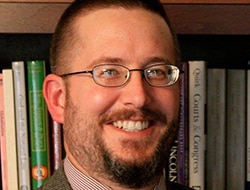
Perhaps the most famous, and certainly the most controversial, line that Pope St. Paul VI ever uttered was “Satan’s smoke has made its way into the temple of God through some crack.” What any given person thinks “Satan’s smoke” refers to seems to depend almost entirely on what he thinks has gone wrong in the Catholic Church over the last several decades.
Perhaps it makes me a bad Catholic (it certainly makes me a bad Catholic commentator), but I’ve always been less concerned with what “Satan’s smoke” refers to than with the “crack” through which it entered. The Church shouldn’t have cracks, and to the extent that it does, it should be a high priority for every Catholic to patch them and restore the Church to its firm foundation in Christ.
With Christ as our foundation, and unity in his body as our goal, there should be no cracks through which Satan’s smoke can enter.
Paul VI’s remark came back to me today when I was reading about the latest “open letter” promulgated by some Catholic leaders, including a former papal nuncio to the United States and two bishops from here. The letter claims that the reaction of governments around the world to the COVID-19 pandemic is “a disturbing prelude to the realization of a world government beyond all control” (emphasis in the original).
Catholics, of course, can disagree in good faith over prudential measures taken by governments. We can disagree in good faith over political matters, though our political activity must be informed by our faith. The problem comes when such disagreements result in divisions, or are even aimed at creating divisions. Such destruction of unity — and not the disagreement itself — is the crack through which Satan’s smoke can make its way into the temple of God.
As I’ve mentioned before, I’m allergic to conspiracy theories, even as I acknowledge that the prince of this world is engaged, with his fellow demons, in the longest-running conspiracy to convince each of us to set ourselves on the road to hell. The problem with conspiracies run by men is that Satan succeeded too well back there in the Garden of Eden, when he convinced Adam and Eve that they could become as gods, if only they ate of the Tree of the Knowledge of Good and Evil. It’s precisely because Adam fell that men who engage in conspiracies seem, for the most part, to be unable to pull them off successfully. Conspirators, by definition, conspire, and they end up conspiring against one another, breaking ranks, and even sometimes regretting their actions, as Judas did when he returned to the chief priests and elders and begged them to take the 30 pieces of silver back.
The more elaborate the supposed conspiracy, the more fallen human nature ensures that it won’t succeed.
But from the standpoint of Satan, he doesn’t need such conspiracies to succeed. In fact, he doesn’t actually need such conspiracies to exist. All he needs is to convince the right people, especially within the Church, that a conspiracy exists, and in the process sow divisions, destroy charity, foster disunity. In other words, all Satan needs is to create the crack through which his smoke can enter.
Let us pray that he doesn’t succeed in doing so here.
Scott P. Richert is publisher for OSV.





